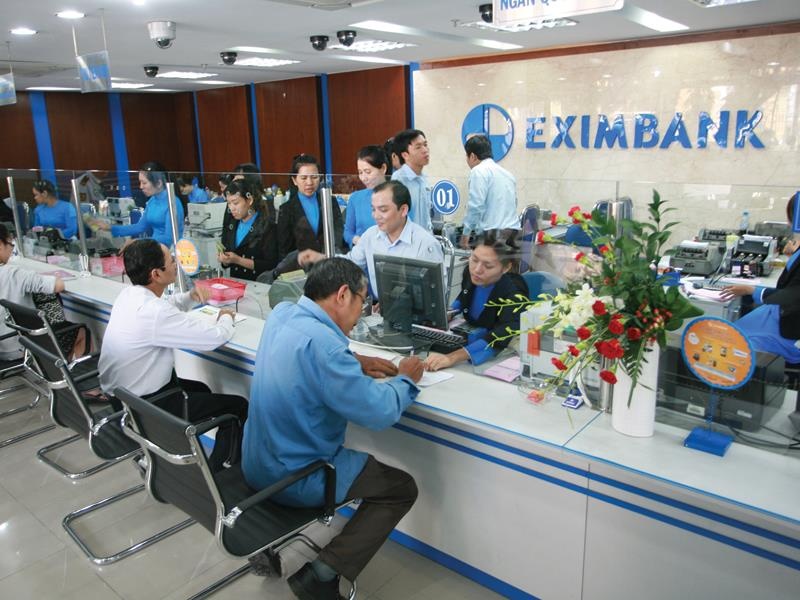Lenders promise investment scale-up
 |
| Lenders promise investment scale-up, photo Le Toan |
Eximbank’s Board of Directors last week approved a resolution ending the strategic collaboration agreement that had been in place since 2007 between Eximbank and Sumitomo Mitsui Banking Corporation (SMBC), the banking arm of Sumitomo Mitsui Financial Group (SMFG).
According to the original agreement, the Japanese banking arm invested $225 million to buy 15 per cent of Eximbank’s charter capital and became the foreign strategic shareholder with the biggest stake. Eximbank was valued at $1.5 billion after the Japanese lender’s engagement, as one of the most vibrant local lenders at the time.
In addition to the dividend, market watchdogs estimated that SMBC bagged VND7.6 trillion ($330.4 million) after 14 years of partnership with Eximbank. This figure, notwithstanding, pales in comparison with the return of Japanese peers Mizuho and MUFG in Vietnam, the largest foreign strategic shareholders of Vietcombank and VietinBank.
Currently, international shareholders own a 29.7 per cent stake in Eximbank. Along with SMBC, in 2008, Eximbank also offered 5 per cent shares to VinaCapital’s VOF fund and another 5 per cent to two Mirae Asset funds. VOF still owns around 5 per cent of Eximbank’s total capital.
After the Eximbank deal, SMBC was widely cited as a potential buyer of Hanoi-based VPBank.
Nguyen Duc Vinh, CEO of VPBank, revealed that it is proactively seeking new strategic investors to adopt international know-how and further enhance its capital position. “We reaffirm our confidence in the leadership’s ability to carry out their promises. Specifically, a foreign tie-up deal is likely to be on the cards in the next several months,” he stated.
SMFG’s president and CEO Jun Ohta revealed earlier this year that the Japanese megabank has “no intentions of scaling down investments in Asia,” as the country’s population continues to dwindle and interest rates remain at historically low levels, Nikkei Asia reported. SMFG is particularly interested in establishing multiple comprehensive financial groups in Asia that can compare with its flagship Japanese unit, SMBC. “We will bet on the macroeconomics of multiple countries, as long as there are possibilities there,” Ohta added.
In Vietnam, the FE Credit tie-up agreement, which was the biggest merger transaction in the history of Vietnam’s financial industry, generated profits of $1.4 billion for VPBank.
A VPBank source revealed that the bank’s equity is estimated to reach VND125 trillion ($5.43 billion) in 2022 with the impending private issue of 15 per cent stock for foreign strategic shareholders. This, however, could pose a significant management problem for the bank.
On the other hand, VPBank will be able to compete in some areas that state-owned banks have not been able to reach before, such as large corporate loans.
“In the past, we were sluggish when it came to competition in current accounts and savings accounts, but this situation will evolve over time,” the source said.
Due to its significant financial resources, VPBank’s leadership made no attempt to conceal its intention to transform from a lending bank to a universal bank model.
As a result, the lender will be more focused on digital banking through VPBank NEO, micro and small businesses, and retail, as well as investment banking and asset management.
| Le Thanh Hoa - Analyst Bao Viet Securities Company
Despite long-running disputes, Eximbank has reaped sweet rewards thanks to SMBC’s engagement and, after five years of collaboration, the bank’s profit even exceeded that of several big banks in the country at the time. However, while other banks advanced rapidly, the uncertainty surrounding the formation of a unified voice among shareholder groups has hampered Eximbank’s efficacy. The bank’s profit varied year to year, and by 2021 it was only around one-third compared to a decade ago. Because of the protracted instability at Eximbank, SMBC might find it difficult to contribute to the bank’s governance structure as well as its commercial operations. Looking on the bright side, SMBC’s withdrawal from Eximbank isn’t always a bad thing for the bank. Instead, this could allow other shareholders to grow their ownership and help Eximbank deal with conflicts, which could improve the bank’s business operations. SMBC’s $225 million investment in Eximbank may have underperformed compared to expectations. The concentrated effort to expand SMBC’s footprint may also fall short of expectations since Eximbank’s loan portfolio has expanded extremely slowly over the course of time. The termination of strategic collaboration may provide a chance for SMBC to work with other banks in Vietnam, and I believe that all privately-run banks are solid targets for the Japanese lender. However, VPBank is deemed to be the candidate with the most potential for SMBC thanks to the FE Credit transaction in 2021. These two partners may rapidly establish a good rapport based on their shared knowledge. VPBank, and any other Vietnamese bank, should be able to receive assistance from a strategic suitor to apply a global governance model, corporate strategy, and other aspects such as product development and employee training to its operations. In addition, it is expected that more banks will be able to access more abundant and low-cost financial sources in the next few years, which might help these banks to strengthen their competitiveness. |
What the stars mean:
★ Poor ★ ★ Promising ★★★ Good ★★★★ Very good ★★★★★ Exceptional
Related Contents
Latest News
More News
- Cashless payments hit 28 times GDP in 2025 (February 04, 2026 | 18:09)
- SSIAM and DBJ launch Japan Vietnam Capital Fund (February 04, 2026 | 15:57)
- Banks target stronger profits, credit growth in 2026 (February 04, 2026 | 15:43)
- Vietnam on path to investment-grade rating (February 03, 2026 | 13:07)
- Consumer finance sector posts sharp profit growth (February 03, 2026 | 13:05)
- Insurance market building the next chapter of protection (February 02, 2026 | 11:16)
- NAB Innovation Centre underscores Vietnam’s appeal for tech investment (January 30, 2026 | 11:16)
- Vietnam strengthens public debt management with World Bank and IMF (January 30, 2026 | 11:00)
- Corporate bond market poised for stronger growth cycle (January 28, 2026 | 17:13)
- Vietnam's IPO market on recovery trajectory (January 28, 2026 | 17:04)


 Tag:
Tag:




















 Mobile Version
Mobile Version